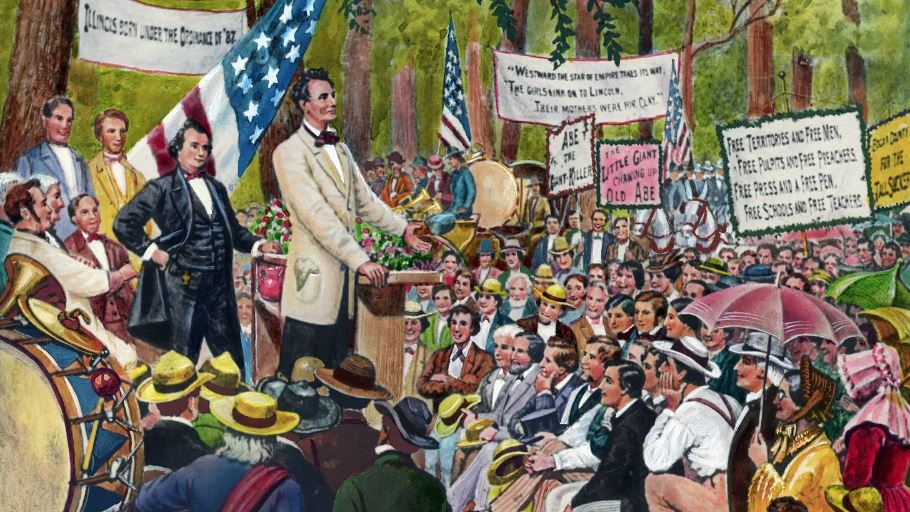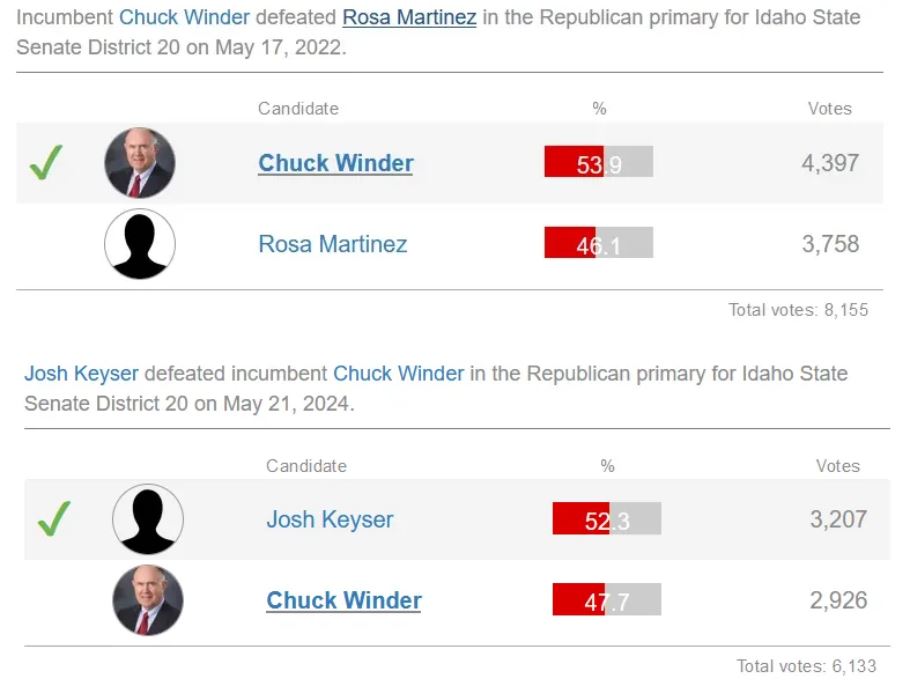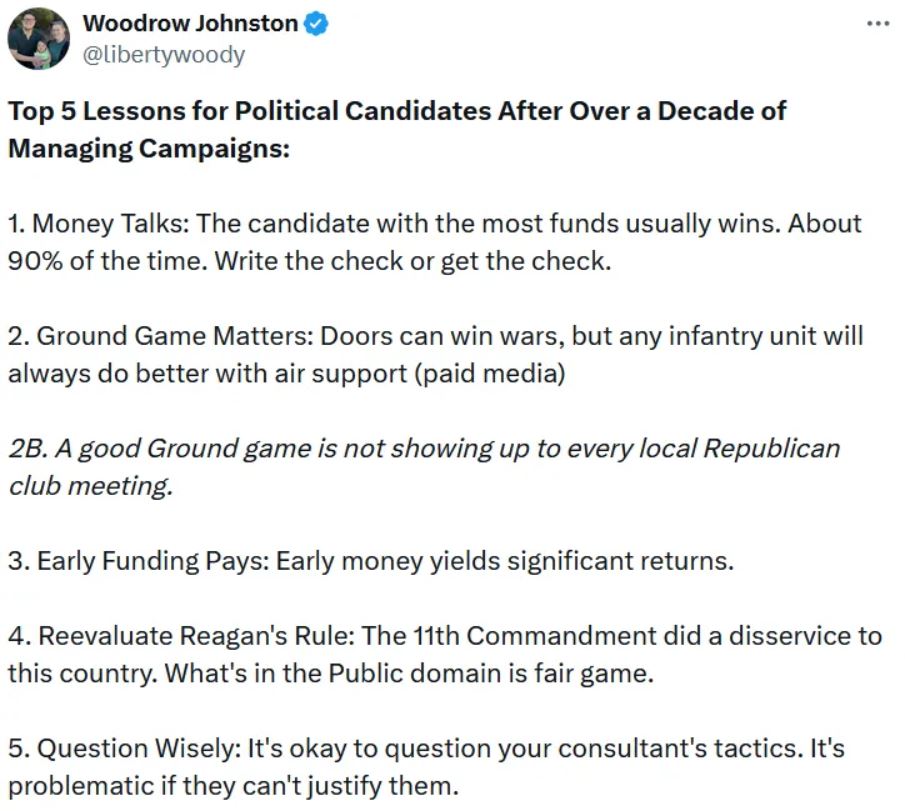
Something Like a War
Modern campaigns are not for the faint of heart
By Brian Almon
As the dust from the 2024 primary campaign settles, people like me will be digging into the results to figure out what worked and what didn’t. Many of the conversations I have with political insiders about the process of campaigning paint a very different picture than most people have of what it takes to win an election, so I wanted to share some of those insights with you here.
I think many conservatives have a mental image of campaigning as something akin to a debate club, where candidates present their ideas to the public and then voters make an informed decision. The popular conception of the Lincoln/Douglas debates in 1858 is perhaps at least partially responsible for the persistence of this idea.

In reality, political campaigning is something like a war. You need air cover (ads on TV, radio, and social media), a ground attack (knocking on doors and meeting voters in person), soldiers (volunteers and/or paid staff), and above all, money (money).
Above all, you need strategy. Of the challengers who won this week, most started their campaigns a year ago. In summer 2023, when most people were completely ignoring politics, candidates like Josh Keyser were making phone calls, raising money, knocking on doors, and networking with potential supporters and allies. Contrast this with candidates who made the decision to run on the last day of the filing deadline in March and raised only a couple thousand dollars.
Strategy means avoiding three-way races. Five House races this year featured two conservative challengers against a moderate incumbent. In only one of those cases was one of the challengers able to overcome the odds and win outright, Steve Tanner in LD13. Reps. James Petzke and Stephanie Mickelsen both managed to win a majority of votes in their races, meaning the split vote was essentially harmless. However, the races in LD1 and LD6 resulted in moderate incumbents winning with less than 50%, which means we could have had two more conservative pickups had one of the challengers dropped out.
Two more races, in LD28 and LD32, saw both a conservative and a liberal challenger to a moderate incumbent. In both cases the incumbent won. The strategy for this situation is slightly different, but it still requires planning and forethought.
Strategy means identifying your voters and getting them to the polls. That means buying good data, knocking on the right doors, and chasing absentee ballots. It’s a lot of tedious work, but it paid off last Tuesday for those who did the work.
Strategy requires ruthlessness. Nobody likes negative advertising, yet it is effective at reducing support for your opponent. Sen. Chuck Winder was absolutely hammered by Young Americans for Liberty, which is a big part of why he became the first pro tem to lose a primary in who knows how long. Turnout in the LD20 race dropped by more than 2,000 voters this year, a decrease of nearly 25% from 2022. Three quarters of those missing voters supported Winder two years ago.

Negative advertising works, whether we like it or not. However, it’s important for candidates themselves to run a positive campaign. Keyser worked hard to remain above the fray, emphasizing what he would bring to the table rather than attacking Winder. When KTVB interviewed him at the watch party as his victory became clear, the first thing he did was praise Winder’s many years of service.
Candidates must stay positive and let PACs and activists launch bombs. Since candidates and PACs cannot legally coordinate their messaging, candidates must establish themselves as bona fide contenders who likeminded PACs are willing to go to war for. This can sometimes backfire, as too much negative advertising can blow back on the candidates themselves. It’s a very fine line. It’s probably best for candidates to simply ignore the work of PACs on their behalf or against their opponents rather than trying to either defend or disavow.
Strategy also means doing your research. While YAL’s attacks on Winder bore fruit they misfired in several other areas. They dishonestly attacked Rep. Julianne Young, saying she voted against removing obscene materials from libraries and for the Idaho Public TV budget, but neither claim was true. They characterized Young as part of an “anti-education entourage” and urged voters in LD30 to oust her, despite the fact that her challenger was much further to the left.
This hurts even more because as of Tuesday night, Rep. Young had lost by only ten votes. A tabulation error was later corrected that brought that margin down to only two. How many Republican voters stayed home or voted for her opponent because of those mailers? That was a major self-inflicted wound by the conservative coalition, and something that needs to be addressed and corrected before next time.
Woodrow Johnston tweeted his lessons for political campaigns this morning as I was writing this article. He is an experienced campaign manager who helped Scott Herndon defeated a longtime incumbent in 2022.

Winning elections takes much more than a candidate with good ideas. Conservatives must begin treating campaigns as projects rather than flights of fancy. If you don’t start with a well-defined plan and then do what is necessary to carry it out, then why bother? You’re just wasting time, wasting donor money, and potentially splitting the vote in a winnable race.
Of course, we must never forget why we do what we do. The strategy is the how, but our principles are the why. We want to keep Idaho a safe and free place for our children and grandchildren to enjoy. The political process is a tool toward that goal, not an end unto itself. It’s easy to get sucked into the strategy and forget why we’re here. The purpose of politics is to win elections, so we have the ability to implement policies that protect our liberties. To accomplish that we need good candidates who understand how to win, otherwise we’re just playing.
Over the next few months, many of us will be dissecting last Tuesday’s results. Let’s figure out what worked, what failed, and how we can continue to win in the future.